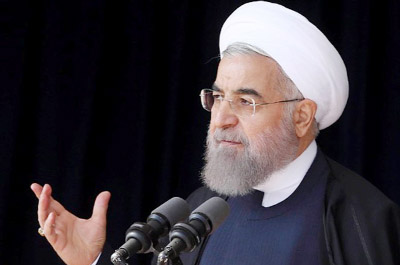
Reuters, Dubai :
Iranian President Hassan Rouhani said on Sunday the choice offered to voters in the U.S. presidential election was between “bad and worse” and that harsh exchanges in the debates pointed to a lack of morality in America, Tehran’s arch adversary.
“America claims it has more than 200 years of democracy, and they have had 50 presidential elections, but there is no morality in that country,” Rouhani said in a speech, carried live by state television.
“You saw the presidential debates, how they talk…, how they accuse and mock (each other),” Rouhani told a crowd gathered at a stadium during his visit to the central city of Arak.
Rouhani said a head of state had asked him during his visit to the United Nations in September about who he preferred between Republican candidate Donald Trump and his Democratic rival Hillary Clinton.
“I said should I prefer bad over worse or worse over bad?,” said Rouhani, a pragmatist politician and cleric who may run for reelection in Iran’s presidential polls in May 2017.
He did not say to which candidate his descriptions referred.
“You see the United States that claims it has had democracy for more than 200 years,” he said in comments broadcast live by state TV. “Look at the country, what the situation is where morality has no place.”
Rouhani said that during his September visit to the UN General Assembly, he was asked which of the candidates he preferred. “I said what? Should I prefer bad to worse or worse to bad?”
Iran’s state TV has broadcast two of the debates between Donald Trump and Hillary Clinton in full. It has closely followed the campaign, often highlighting economic and social problems in the U.S. and the most confrontational debate segments.
Rouhani’s speech marked his first public comment on the U.S. election.
Iran will hold its own presidential election in May 2017, and Rouhani is eligible to seek a second term.
Last month, hard-line former President Mahmoud Ahmadinejad said he will not run in the election. Opposition to his candidacy exposed the still-lingering wounds from the widespread unrest that followed his contested 2009 re-election.
Despite a landmark nuclear deal with the United States and world powers that went into effect in January, Tehran and Washington have not restored diplomatic ties that were cut after the 1979 Islamic Revolution and U.S. Embassy takeover.
The deal capped Iran’s disputed nuclear activities in return for lifting international nuclear-related sanctions.
Iranian President Hassan Rouhani said on Sunday the choice offered to voters in the U.S. presidential election was between “bad and worse” and that harsh exchanges in the debates pointed to a lack of morality in America, Tehran’s arch adversary.
“America claims it has more than 200 years of democracy, and they have had 50 presidential elections, but there is no morality in that country,” Rouhani said in a speech, carried live by state television.
“You saw the presidential debates, how they talk…, how they accuse and mock (each other),” Rouhani told a crowd gathered at a stadium during his visit to the central city of Arak.
Rouhani said a head of state had asked him during his visit to the United Nations in September about who he preferred between Republican candidate Donald Trump and his Democratic rival Hillary Clinton.
“I said should I prefer bad over worse or worse over bad?,” said Rouhani, a pragmatist politician and cleric who may run for reelection in Iran’s presidential polls in May 2017.
He did not say to which candidate his descriptions referred.
“You see the United States that claims it has had democracy for more than 200 years,” he said in comments broadcast live by state TV. “Look at the country, what the situation is where morality has no place.”
Rouhani said that during his September visit to the UN General Assembly, he was asked which of the candidates he preferred. “I said what? Should I prefer bad to worse or worse to bad?”
Iran’s state TV has broadcast two of the debates between Donald Trump and Hillary Clinton in full. It has closely followed the campaign, often highlighting economic and social problems in the U.S. and the most confrontational debate segments.
Rouhani’s speech marked his first public comment on the U.S. election.
Iran will hold its own presidential election in May 2017, and Rouhani is eligible to seek a second term.
Last month, hard-line former President Mahmoud Ahmadinejad said he will not run in the election. Opposition to his candidacy exposed the still-lingering wounds from the widespread unrest that followed his contested 2009 re-election.
Despite a landmark nuclear deal with the United States and world powers that went into effect in January, Tehran and Washington have not restored diplomatic ties that were cut after the 1979 Islamic Revolution and U.S. Embassy takeover.
The deal capped Iran’s disputed nuclear activities in return for lifting international nuclear-related sanctions.

